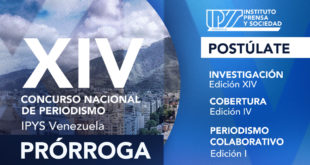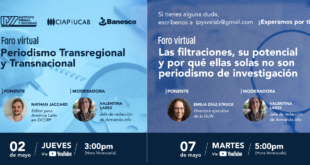Durante el mes de junio de 2013, los reporteros de la fuente de Salud de los medios privados de comunicación del estado Lara, denunciaron que desde la Dirección Sectorial Regional de Salud, que preside María Teresa Pérez, que se restringe la información -y específicamente las estadísticas- de los casos de que se han presentado en la entidad con el virus H1N1. Así lo informaron a IPYS Venezuela las reporteras Keren Torres y Marianli Suárez que cubren la fuente de Salud en el diario privado local, El Impulso.
Esta situación se presentó desde que la ministra de Salud, Isabel Iturria declaró, el 28 de mayo, en los medios que las estadísticas con respecto a la situación del virus H1N1 no eran realmente importantes (). Antes de esta fecha, los reporteros de salud obtenían información sobre los casos, que presentaban las autoridades de salud de la entidad
Torres y Suárez explicaron a IPYS Venezuela que los días martes se informa a través de conferencia de prensa el reporte o resumen epidemiológico, en el cual e indican los casos sospechosos, casos confirmados y número de pacientes que han fallecido por el virus.
Torres afirmó que desde el pronunciamiento oficial de la ministra Isabel Iturria, el gobernador del estado Henri Falcón y el Secretario de Gobierno, Teodoro Campo, fueron los encargados de suministrar lo datos específicos de números de casos a los medio.
“Esta situación se suscitó durante un mes. Apenas, el 18 de junio, se le permitió a la Directora de Salud volver a tener derecho de palabra para aportar información al respecto. Además se nos niegan los nombres de los centros asistenciales donde fallecen las personas y ni siquiera conocemos su identidad”, agregó.
La reportera, igualmente, señaló que hay mucha desinformación con respecto al tratamiento o medicamento que se les suministra a los pacientes que padecen de esta enfermedad. “No sabemos cuál es el nombre del medicamento y mucho menos si realmente es idóneo, porque hasta donde se supo al principio no estaba siendo el efecto esperado, pero no se nos informó más nada al respecto”, añadió Torres.
Por su parte, Suárez dijo que aunque han tenido acceso a información desde el ejecutivo regional le genera inquietud las limitantes para poder informar sobre esta la situación del virus de la H1N1. Sin embargo, señaló que cada vez es más limitada porque solo pueden conocer de los casos y estadísticas los días martes en la mañana cuando se ofrece la rueda de prensa, el resto de los días si desean buscar información o confirmar algún tipo de novedad no pueden hacerlo.
Explicó que en el existen dificultades para realizar el seguimiento de la información sobre la influenza. Comentó que de 30 personas portadoras del virus en Barquisimeto hubo un salto a 100, según se informó en el último balance que ofrecieron las autoridades
“Esto generó impacto porque se elevó el numero de casos y no tuvimos acceso a ese dato. Lo más grave es que no se le pudo informar a la colectividad que está ávida de conocer lo que está sucediendo con respecto a este tema”, concluyo.
Estas limitaciones de acceso a la información pública sobre la situación de la influenza H1N1 en Lara, se suman a las restricciones de acceso a las fuentes que se han presentado en los estados Falcón y Portuguesa, en la misma coyuntura.
________________________________________________________________
Lea la versión en inglés
Lara: Access limited to official information on the H1N1 virus
During the month of June 2013, the health source reporters of private media of Lara state denounced that information was restricted from the Regional Sectorial Health Department presided by María Teresa Pérez -specifically on statistics- of cases of the H1N1 virus in that state. This was informed to IPYS Venezuela by reporters Keren Torres and Marianli Suárez who cover the health source for private local newspaper El Impulso.
This happened since the health minister Isabel Iturria declared in the media on May 28 that the statistics on the situation of the H1N1 virus were not really important (). Prior to that date, the health source reporters obtained information on the cases through information presented by the state´s health authorities (http://www.youtube.com/watch?v=bCT6CMMz1TM).
Torres and Suárez explained to IPYS Venezuela that the epidemiological report or summary was given through press conferences on Tuesdays, indicating suspected cases, confirmed cases and the number of patients who died due to the virus.
Torres affirmed that since the official pronouncement by minister Isabel Iturria, the governor of the state Henri Falcón and the Secretary of government, Teodoro Campo, were entrusted with supplying specific data on the number of cases to the media.
“This was the situation for an entire month. Only recently, on June 18, was the health director allowed to have the right to give information in this respect. We were also denied the names of the healthcare centers where patients died and we don´t even known their identities”, she added.
The reporter also pointed out that there is a lot of misinformation with respect to the treatment or medicines supplied to the patients suffering from this illness. “We do not know the name of the drug and even less if it is really the best drug because so far as was known, at the beginning it was not offering the expected result but we received no information in this regard”, Torres added.
In turn, Suárez said that although they have had access to information from the regional executive power they are concerned over the limitations to be able to inform on the situation of the H1N1 virus. However, she pointed that it is increasingly limited because they can only find out about cases and statistics on Tuesday mornings when the press conference is offered. The other days if anybody wants to obtain information or confirm any type of news, they cannot.
She explained that there are difficulties in following up on information regarding the influenza virus. She commented that of every 30 persons bearing the virus in Barquisimeto it jumped to 100, as informed in the latest balance offered by the authorities.
“This generated an impact because the number of cases increased and we had no access to this data. The worst part of this is that the collective public was not informed and they are avid to know what is going on regarding this health situation”, she concluded.
These limitations in accessing public information on the situation of the H1N1 influenza in Lara is coupled to restrictions accessing the source which have taken place in Falcón and Portuguesa state, regarding this situation.
Label: arbitrary limitations to covering affairs of public interest
 IPYS Instituto Prensa y Sociedad Venezuela
IPYS Instituto Prensa y Sociedad Venezuela



